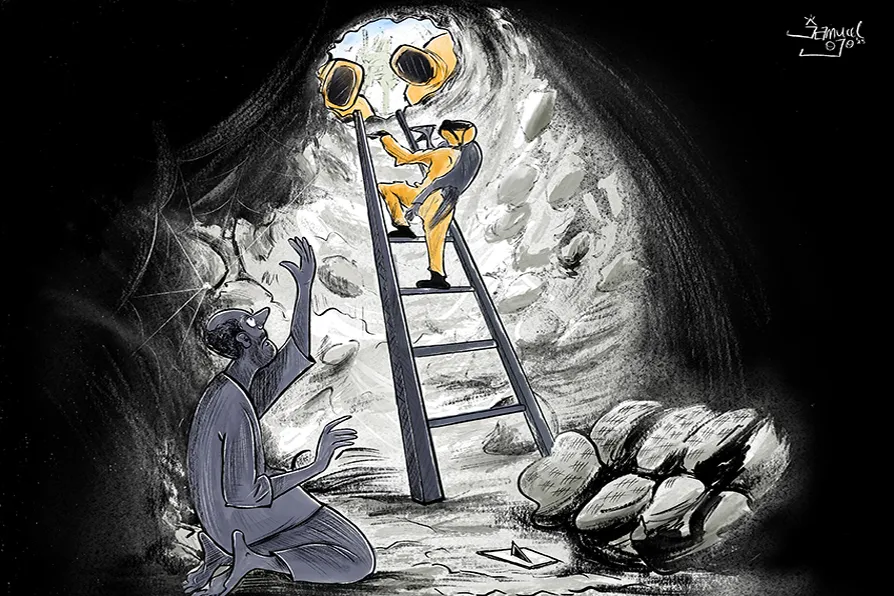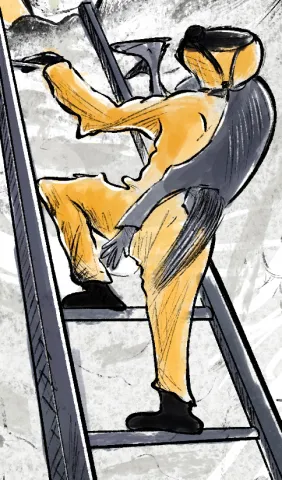GAVIN O’TOOLE examines the fatal relationship between environmental crimes and politics in Brazil and the inspiration provided by Indigenous people
A deadly epidemic has led to martial law. Behind boarded-up windows — in a house haunted by abduction, hunger and fragmented memories — a shred of desperate hope remains.

 Illustration by Samuel Ojo
Illustration by Samuel Ojo
THE usual morning stuff; kitchen sounds, kettle boiling, the smell of toast and coffee from downstairs whilst he slowly came to. She always rose first in the morning, would sit at the table, waiting, a mug of coffee, steaming, by his chair; toast crumbs caught in the corner of her mouth. Every morning, day after day the same, pressed down, one atop the other for years and years. Sometimes he hated it. The weight of it all, the predictability. Then it was gone, just like that, whisked away, like a conjuring trick, a sleight of hand.
Now, when he wakes, in those first few seconds, in a fog, in a fugue-state, the coffee smells and the muted morning noises still percolate and echo until reality presses in, a cold hand upon his face. He makes his way downstairs — the third step creaks a little, as does the sixth — and the kitchen greets him, baleful, neglected. There are gossamer webs in two corners of the ceiling, an unidentified streak across the worktop. She would not have allowed these, not for a moment. He realises now that much of her cleaning was pre-emptive, anticipatory. He has no gift for this, no inclination. He doesn’t care particularly, but he knows that she would care so he does care about that. Although not enough to act, it seems.
He makes coffee with dried milk — while there is coffee, while there is milk — and takes it into the living room. It’s a small room. It’s a house of small rooms, six of them and a hallway, a landing upstairs. It seems smaller than ever now that she’s gone, which he supposes is odd.
He thinks it was a Saturday when they took her. She would have known, the day and the date. Now he is not entirely sure of the season. Possibly summer, edging into autumn? It doesn’t matter.
I ache a little, she said, I feel hot.
It’s probably nothing, he said. Take some tablets, go to bed for a while. I can manage down here.
She smiled at that. It was the last smile he could remember. I must call, she said.
Please don’t.
It’s my duty. She reached out a hand but he didn’t take it. She tucked it back in her lap. It’s my duty, she said again.
Duty, he said, then stood and went into the garden. The garden, like the house, like himself and like his life, was small.
They came within the hour. She was whisked away with practised ease. They wore orange suits, masks, heavy gloves. They didn’t speak. Neither did she, tiny in the midst of them, borne aloft and swept through their front door into the bright, vivid air. He’d painted the door green a couple of years ago; three coats of a rich gloss that he rather liked. They nailed it shut. They hammered thick wooden boards across the windows too, upstairs and down, the same as most of the other houses in the crescent, as though the troops that patrolled intermittently, weapons at port arms, were not enough of a deterrent against braving the outside.

Sometimes he paces through the rooms in a certain order, slowly, methodically, although even then it doesn’t take long. Each room is now a scene of historical interest. A site of battles lost and, occasionally, won.
He can still see the shape of her on the left side of their bed. Her scent lingers around the armchair in the living room; years and years of her embedded in walls and fabric. A life’s quiet sediment. He sniffs at things sometimes during his tour of the house; random items — a vase, a figurine — as though he is something wild, a fox perhaps.
They left a large cardboard box in the hallway. In large letters someone had written on the top:
RATIONS. MORE TO FOLLOW.
There were tins of tuna and baked beans, some bread, dried milk, coffee and tea. There were also two large bars of milk chocolate. He took the chocolate into the kitchen and ate it all in a series of vast, gulping bites. He cried as he ate. The sugar over-loaded his brain. He felt sick. A helicopter hovered nearby then veered away again. He heard shouting from somewhere distant. He pressed the chocolate wrappers into balls and pushed them into his mouth.
At some point, when he realises that his mug is empty, he wanders back into the kitchen. There is a small gap where they boarded the window and he can see into the crescent. A blackbird flits across the scruffy grass that abuts the curb, looking for scraps. Poor little bastard, he thinks. Tears leak across his face. This happens frequently. It seems to be beyond his control.
He has no memories. No. This is not entirely true. At some point his mind atomised. He does have memories but they are scattered, fragmented, part of an indecipherable diaspora. They have become like a vast jigsaw puzzle, but one lacking the edge pieces that can be easily separated from the rest. Anyway, he always hated jigsaws. He can recall that, at least.
She was pretty, he is sure of that. Beautiful even. And there was a wedding, of course. He supposes there must have been. Children? Almost certainly not, although they tried, he thinks. They tried. And there was work too, for both of them, years and years of it, but God knows what.
And now there’s this; beyond the boarded window the light is sour and appears to have its own weight; as, later, will the lack of it. Three soldiers patrol, pacing the empty road. One of them pauses and leans forward suddenly, yanking down his face mask and spitting a large clot of scarlet blood onto the dusty concrete. The other soldiers turn, backing away. That’s bad, he thinks, watching, fingers pressed against dirty glass. Really bad. He knows that, at least. You can take that to the bank.
An hour after they took her he gathered together all of her old mugs and cups and smashed them into pieces. He threw the remains into the box that had contained the food. Then he gathered the photos of her that stood on the mantelpiece and on his bedside table and laid them face down in the linen drawer. Then he cried a little. Then he stood and watched the light fade quietly in the slit of sky visible through the boarding that covered his bedroom window.
He remembered something. It was night-time, probably. Well, it was dark, so that was a clue.
A conversation. Or part of one.
I think I caused this. He sat in the usual chair; she was perched forward in the armchair to his right.
What’s that?
They were watching the news, or what passed for it. A middle-aged man, tanned still, somehow and with too much hair, sat in what looked very much like a cell. He was meant to be reporting the latest case mortality figures. The percentage had been rising inexorably for some weeks. Now, when the man checked the figure on the screen of his iPad, he looked up at the camera, his eyes becoming wide. He tapped his front teeth with the end of his biro and cut the feed.
I remember thinking how bored I was. With my life. Our life. The routine of it all.
I see.
And now this.
Well, yes. It’s irrefutable, then, isn’t it? It’s all your fault.
He said nothing.
Solipsism, she said slowly, her eyes alight, her smile angled and wry. Are you familiar with the term? Would you like me to spell it for you?
I know the word, he said, although he didn’t. He tried to make his voice gruff but failed. He liked the mocking, the gentleness of it, the warmth. She laid her fingers softly on his forearm and he smiled in spite of himself.
*
The next day, or perhaps the day after, he stands in the bedroom again, at the window. His perception is limited to this; an arrow-slit of light. It’s probably just as well, he thinks, it’s about all the stimulation he can process at the moment.
Sometime later and he hasn’t moved. The day is almost done. The sunset beyond the letter-box view is like an open wound. Gunshots sound from somewhere to the West, interrupting the soft burr of evening, as they usually do at around this time.
The food has gone. But they said more would follow. He has it in writing.
He does not ache. Not physically, at least. He does not feel hot. I’m one of the lucky ones, he thinks. He chuckles wetly.
She has gone. But she may survive. His heart jolts at the thought. The mortality rate is too high; vertiginous, absurd. But it is not 100%.
She could survive.
They could bring food.
He finds that he is saying these words over and over, like a prayer. But it’s not a prayer. Her words, not his. Her voice, warm upon his cheek.
Dusk laps against the window. He sees himself reflected in the glass. She is beside him, her head canted towards his shoulder.
He remembers something else.
Andrew Humphrey has been widely published in the independent press, in magazines such as Black Static, Crimewave, The Third Alternative, Weird Horror and Nightjar Press. The author of two novels and three short story collections, Andrew lives in Norwich.










